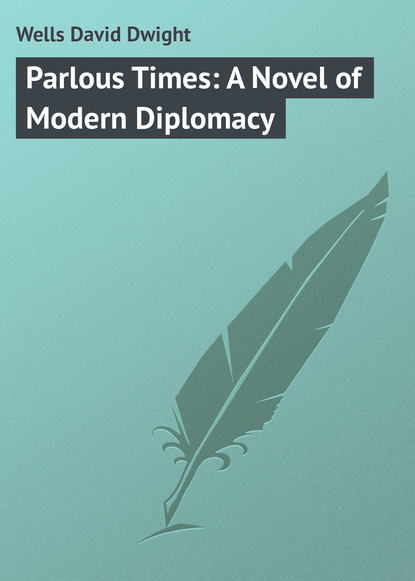По всем вопросам обращайтесь на: info@litportal.ru
(©) 2003-2024.
✖
Parlous Times: A Novel of Modern Diplomacy
Настройки чтения
Размер шрифта
Высота строк
Поля
She sighed, and then feeling perhaps that she had said too much, hastened to revert to their original subject, saying:
"Don't tell me there's a misunderstanding between you and Miss Fitzgerald. I'm so sorry. I wouldn't for the world – that is, I almost feel as if I'd been to blame."
"You're not the only one of my friends who has misjudged her – I've done so myself – utterly."
"But surely this little difference will not be lasting – I hoped – "
"Would you wish me to marry Miss Fitzgerald, Lady Isabelle?"
"Well, perhaps I won't say that – but I should certainly not wish anything I might have said to prevent you from so doing. Of course, my only reason for interfering was prompted by a wish for your happiness."
"Do you think you understand what that comprises?"
"That's just the point I wanted to make clear," she said hastily, determined that he must understand, even at the expense of a slight indiscretion on her part, which she felt would be far preferable to the slightest misunderstanding of their relative positions, in view of any future action of her mother's.
"You see," she continued, "to put it frankly, what could I possibly know of the requirements which, in a woman, would go to make you happy. Of course, you and I are friends, great friends; but just that state of affairs, as far as we're concerned, makes any judgment of mine useless concerning the kind of woman you could love."
Stanley, who could scarcely help drawing his own inferences, was piqued that she should have felt it necessary to batter a self-evident fact into his brain in such a bald manner.
"I wish," he said, "that her Ladyship, your mother, was possessed of the same lucid views on kindred subjects."
"Poor mamma," murmured his companion, "she's a trifle conventional; but, of course, if you're not in sympathy with her, you can easily avoid her."
There, the cat was out of the bag at last, and both felt easier in consequence. Stanley threw himself into the breach at once, and took the burden of the conversation.
"I'm sure," he said, "I don't believe that half of the people in the world can tell for the life of them why they fall in love with a certain person and not with another. As we're talking confidentially, I don't mind telling you that I've decided that I'm in love with Miss Fitzgerald, and that the best thing I can do is to tell her so as soon as possible, though I'm afraid there is little chance of her having me."
"I can honestly say," rejoined his companion, "that, if that is how the case stands, I do hope you'll be successful."
Having arrived at this amicable and highly satisfactory conclusion, they realised that in the earnestness of their discussion they had not noticed the lapse of time.
"Dear me, it must be getting late. I trust we're not far from the Hall," said Lady Isabelle.
"To tell you the truth, I don't know just where we are," he replied.
They were standing in a thick plantation at the time, through which meandered the little path they were following.
"There's rising ground ahead, however," he continued, "and, I think, a clearing."
This proved to be the case, and when they had gained the little knoll they saw, nearly in front of them, across a slight valley, bordered on either side by wide stretches of fields and pasture-land, the Hall.
"It doesn't look to be half a mile distant, but I doubt the wisdom of trying a short cut," he said, "We'd much better keep to our path."
Their prudence had its own reward, for they had not been walking five minutes before they encountered a peasant, who, with more good nature than brevity, directed their steps in a way that was too plainly not a short cut. However, there was nothing for it now but to push on, and though they walked rapidly, it was a long time before they reached the Hall.
Unkind fate prompted them on their arrival to venture into the drawing-room in search of a belated cup of tea, and, to their dismay, they found the apartment, which should have been deserted at this hour, tenanted solely by the Dowager, who had evidently been awaiting their return.
She was much too formally polite to make them feel at their ease, and with a word dismissed her daughter, on the plea of removing her wraps, thus leaving the Secretary to his fate.
Once they were alone, her Ladyship surveyed the young man deliberately through her lorgnettes, and when she had made him sufficiently nervous, remarked in a chilling tone that she trusted her daughter had caught no cold from walking so late in the park.
The Secretary acquiesced, and then the Marchioness opened the attack in earnest.
"We – my daughter – has had the pleasure of seeing a great deal of you lately, Mr. Stanley."
"Er, yes," he replied, scenting danger. "Of course it's been a great pleasure to me."
"Still," she continued, "it is not usual for a young lady, unchaperoned, to walk in the park with a gentleman at this hour; a gentleman who is, shall we say, a mere acquaintance."
"The matter was one of necessity," he replied shortly. "We lost our way."
"Mrs. Roberts has driven me over her grounds repeatedly, and it appears to me to be quite impossible for anyone to really lose his way."
"Deference to your Ladyship's opinion prevents me from saying more."
"It is certainly not pleasant," resumed the Dowager, ignoring his last remark, "to continue this conversation, and, were my late husband living, I should naturally have left the matter to him; as it is, my duty as a mother and my desire for dear Isabelle's welfare bids me – "
"Really, your Ladyship, am I to understand you to imply – "
"I can only say that I have heard your name associated with my daughter's in a manner – that was not – quite as I could wish. Dear Lady Wintern, a woman most interested in the good of her friends, spoke to me herself, and of course you, as a man of honour and a gentleman – "
"As a man of honour and a gentleman, I deeply regret that anything in my conduct should have led to a misconception in regard to my relations with Lady Isabelle, and in the future – "
"In the future, Mr. Stanley, you will of course see little or nothing of my daughter – unless – "
She paused, and for a moment neither spoke. Then the Secretary, who, whatever else may be said of him, was not a coward, seeing what was impending, determined to face the situation and have it over as soon as possible.
"Am I to understand," he inquired, "that you're asking me my intentions?"
Her Ladyship raised her eyebrows. If the French shoulder is expressive, the English eye-brow, feminine, speaks volumes.
"You do not make the situation easy for me," she replied. "Of course I speak only for myself. What my daughter may feel – "
"You don't suppose," he exclaimed, "that Lady Isabelle really thinks – "
"I know, Mr. Stanley, that my daughter thinks nothing and does nothing that would not be proper in a young lady of her position."
"Then I've only to apologise," he said, rising, "for what you force me to believe is my fault, however unintentional." And, bowing gravely to her, he quietly left the room.
CHAPTER XVI
MAN PROPOSES
As he dressed for dinner that evening, Stanley was still smarting with irritation at the undeserved attack which had just been made upon him by the Marchioness, and which through no fault of his own placed him in an exceedingly unpleasant and awkward position towards her daughter. The sooner he proposed to Miss Fitzgerald, and their engagement was announced, the better for all parties concerned. So seeking to justify himself by force of circumstances, he threw prudence to the winds and determined to speak that very night.
If, however, his private affairs had progressed rapidly to a crisis, the official interests which, he assured himself, were the real cause of his presence here, had not progressed at all, and he seemed no nearer the solution of the mystery, and the apprehension of the conspirators, than when he arrived.
True, Lady Isabelle's confession concerning Kingsland only served to strengthen his own conviction that the Lieutenant was Darcy's confederate; but Darcy himself, the prime mover of the plot, had not as yet put in an appearance, and till he arrived there was nothing to be done but to watch and wait.







